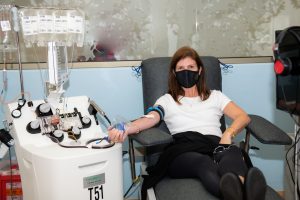S.C. Lt. Governor Pamela Evette, area hospital leaders join The Blood Connection in event to increase convalescent plasma donations to treat COVID-19 patients
October 29, 2020Evette donated plasma on-site to demonstrate the ease of process
As part of its recently launched “Turn Positive into a Positive” campaign to secure badly needed convalescent plasma donations, The Blood Connection (TBC) recently hosted a community education event at its Woodruff Road location. Guests included the chief clinical officers of Prisma Health and Bon Secours St. Francis Health System, who shared their experiences with the effectiveness of convalescent plasma as a treatment for COVID-19 and the current and expected future need for convalescent plasma, especially as the number of cases surges upward in the Upstate.
Lt. Governor Evette, who recently recovered from a mild case of COVID-19, allowed the media to document her live convalescent plasma donation to illustrate the ease of the process.
“As South Carolinians we pride ourselves on the fact that we help each other, and this is one easy way we can all come together,” said Evette. “If you’ve been one of the fortunate people who have recovered from the virus, I ask you to take a look at a someone you love who might find themselves in a bad position and let that be what inspires you to come and do something good by donating convalescent plasma.”
The plasma of those who have recovered from COVID-19 may contain antibodies that help fight the disease. Collecting this plasma from survivors and transfusing it into patients who are experiencing respiratory distress can boost the recipient’s immune system and spur it on to generate more of its own antibodies to fight the disease. As Evette demonstrated, donating is as easy as donating blood, and donors can give plasma as often as once every 14 days.
The physicians from Bon Secours St. Francis Health System and Prisma Health emphasized the fact that, while convalescent plasma does not work in all patients, it has shown remarkable results in terms of reducing the severity and longevity of the illness in patients across the Upstate and the country. The speakers also stressed the need to build a critical stockpile of convalescent plasma that will be required, should numbers continue to rise with the advent of colder weather and possible holiday gatherings.
“We’ve seen convalescent plasma shorten the disease and impact the severity of the disease, so it’s an important tool in our ability to treat COVID-19, and it’s very important to secure donations, especially as the numbers are starting to go back up,” noted Dr. Marcus Blackstone, Chief Clinical Officer, Bon Secours St. Francis Health System.
Physicians also urged area residents to remain vigilant and focused on protecting their families, as well as their friends and neighbors, despite so-called COVID fatigue.
“We’re very concerned about the holidays,” said Dr. Wendell James, Chief Clinical Officer at Prisma Health—Upstate. “We’re in the second cycle of a global pandemic, and that is always the point where we have to be the most attuned to being careful because people have grown tired of taking precautions of it. They want to go back to business as usual, but we can’t let our guard down — because, if we do, we’ll spike these numbers again.”
In addition to plasma donations, TBC always welcomes and needs normal blood donations.
To donate, please visit www.positive2positive.com or follow us on Facebook: https://www.facebook.com/TheBloodConnection, Twitter: https://twitter.com/bloodconnection, or Instagram: https://www.instagram.com/thebloodconnection/.
About The Blood Connection
Founded in Greenville, SC, The Blood Connection (TBC) has been committed to saving lives since 1962. TBC is an independently managed, not-for-profit, community blood center that provides blood products to more than 80 hospitals within South Carolina, North Carolina and Northeast Georgia. Recognized by the U.S. Congress for its dedication to disaster preparedness and the community, TBC works diligently to collect blood from volunteer donors to meet the ever-increasing demand. By keeping collections local, TBC serves hundreds of thousands of patients a year in its communities. TBC is licensed and regulated by the U.S. Food and Drug Administration. For more information, please visit www.thebloodconnection.org.














